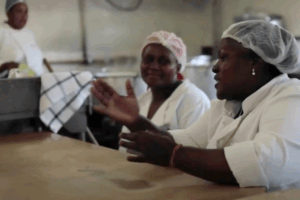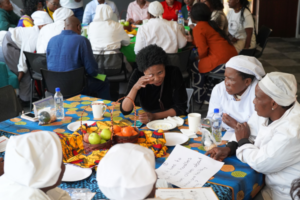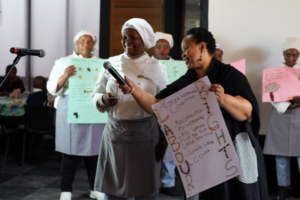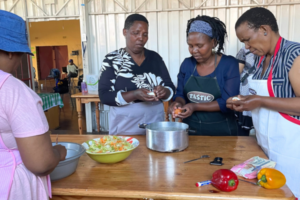Volunteer Food Handlers struggle to access UIF benefits at the end of their two-year contracts working under the National School Nutrition Programme (NSNP). Despite contributing to the Unemployment Insurance Fund, they face delays, misinformation, and a lack of support. The NSNP, implemented by the Department of Basic Education, is among the social sector programmes of the Expanded Public Works Programme that rely on women’s labour.
This article is the second in a series on our campaign with a group of former and current Volunteer Food Handlers in Gauteng, for adequate access to UIF benefits. Read here (UIF framework), here (role play as a feminist popular education tool in UIF campaign by food handlers), here (dignity, labour and access to UIF), and here (a day in the life of a food handler).
We have been meeting with the group of Volunteer Food Handlers whose contracts under the National School Nutrition Programme (NSNP) ended on 30 March 2025. This is what they are reporting regarding the UIF claiming process:
Food Handlers trying to claim UIF benefits are caught in a bureaucratic runaround. When they seek assistance from school principals, they are directed to district offices. But when they arrive at the district offices, they are told to return to their schools. The back-and-forth leaves them exhausted and discouraged.
In the second week of April, NSNP school coordinators and principals stated that they would be visiting the district office to register outgoing food handlers in the Department of Labour (DoL) system for UIF benefits. The principals then registered food handlers without verifying their actual hours of employment. This has led to complications during the registration process, as they often complete the salary schedule form with any working hours they prefer. Ideally, each food handler is expected to work eight hours a day.
Food Handlers challenged these entries, but principals said while they understood, they could not change the hours without a formal communiqué from the district office. According to principals and coordinators, 120 or 130 hours has been the norm for years. But there is no communique showing that they should provide 130 hours, as this issue has never been questioned before.
Food Handlers raised concerns about the hours, but principals said they cannot make changes without official notification from the district office. Principals and coordinators say that 120 to 130 hours have been the standard for years, yet there is no official communication confirming this requirement, as it has never been challenged before.

L–R: LRS Educators George Mthethwa and Nosipho Twala in a role-play exercise with a participant during a learning activity to build the capacity of Volunteer Food Handlers to advocate for better access to UIF benefits | April 2024, Gauteng Province.
Principals use their discretion and overlook the additional work Volunteer Food Handlers perform during school events or the extra time they spend waiting for suppliers to deliver food. The Coordinators rely on records from previous coordinators, who also allocated between 120 and 130 hours. They ask, “why should we deviate this year?”
At our recent meeting with the Department of Basic Education (DBE), officials informed the LRS that Volunteer Food Handlers work eight hours a day and get a stipend for the eight hours. This amounts to 160 hours of work each month. It appears that many school principals are not aware of this guideline, as they often assign what they believe to be appropriate hours.
The lack of uniformity and consistency is causing significant stress, discomfort, and concern among food handlers. They often discuss issues related to working hours with their peers from nearby schools and express frustration when they notice discrepancies.
Some food handlers report that their monthly stipends are deposited into their children’s bank accounts. This situation arises because Principals are not ensuring that stipends are paid directly to the registered food handlers at their schools. Meaning that stipends could be paid to anyone with the same surname as the food handler. This may sometimes occur to protect the Volunteer Food Handler, as the principal understands their struggles, or it could simply be carelessness.
Our observations
While there are challenges compared to previous years, it appears that the NSNP directorate has communicated with the school principals to support Volunteer Food Handlers in claiming their UIF. However, difficulties persist, as the district offices need complete information to effectively assist principals and coordinators.
In the past, it took nearly eight months for food handlers to be able to claim or appear in the Department of Labour (DoL) system. Volunteer Food Handlers participating in our campaign for decent work and valuing of care work under NSNP have started asking principals about UIF before their contracts end. Some have already claimed their UIF and are currently waiting for the DoL to process these claims. Others have encountered challenges, for example, one food handler discovered her previous employer still lists her as an employee in the DoL system. She is trying to resolve the issue, with LRS assistance.
The Department of Basic Education (DBE) should register Volunteer Food Handlers for the UIF at the start of their contracts. This would allow them to identify and resolve potential challenges early. Why does the DBE wait until the end of the contract to register food handlers, while other employers register them at the beginning?
The DBE should encourage school principals to issue payslips to Volunteer Food Handlers. This documentation can be helpful when they apply for UIF benefits. Currently, food handlers must return to the school to address minor issues that could easily be resolved if they had access to their payslips. Schools must take their role as employers seriously and approach it with care and diligence.
Food Handlers have reported that programme coordinators and principals often get frustrated when they have to return to the school frequently for assistance with incorrectly completed forms or issues related to working hours. Providing clear payslips could help reduce the number of visits to the school.
RELATED CONTENT
UIF claiming process: The experiences of Volunteer Food Handlers
VIDEO: Access Denied – A Woman Worker’s Struggle for Social Protection
The experience of former Volunteer Food Handler Elizabeth is a powerful reminder of what’s at stake. Her struggle to claim UIF resonates with the experiences of many former Volunteer Food Handlers nationwide.
The UIF advocacy is part of our broader campaign with Volunteer Food Handlers for decent work and valuing of care work in public care work programmes.












